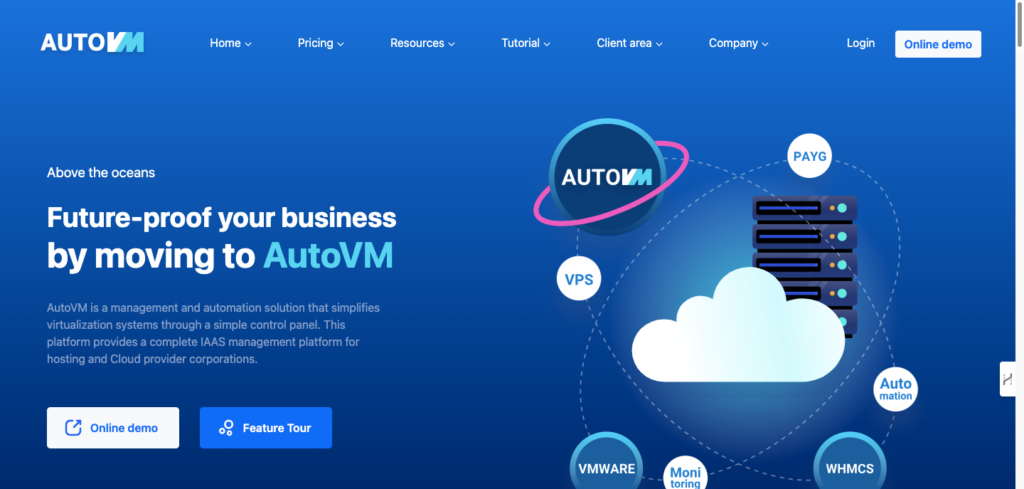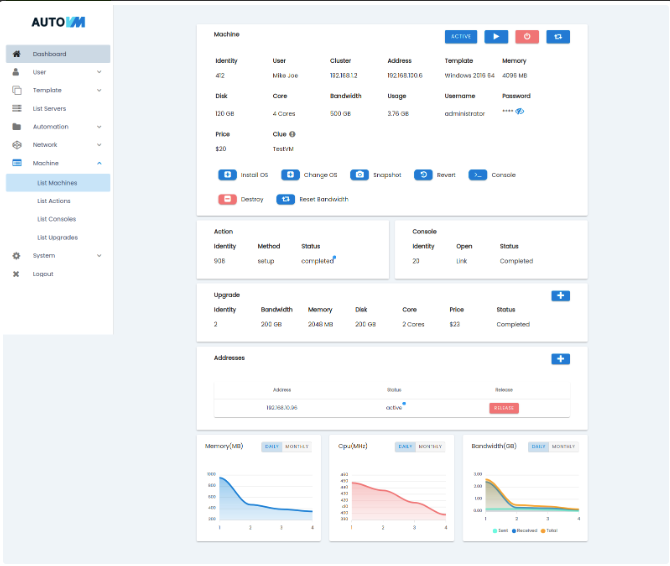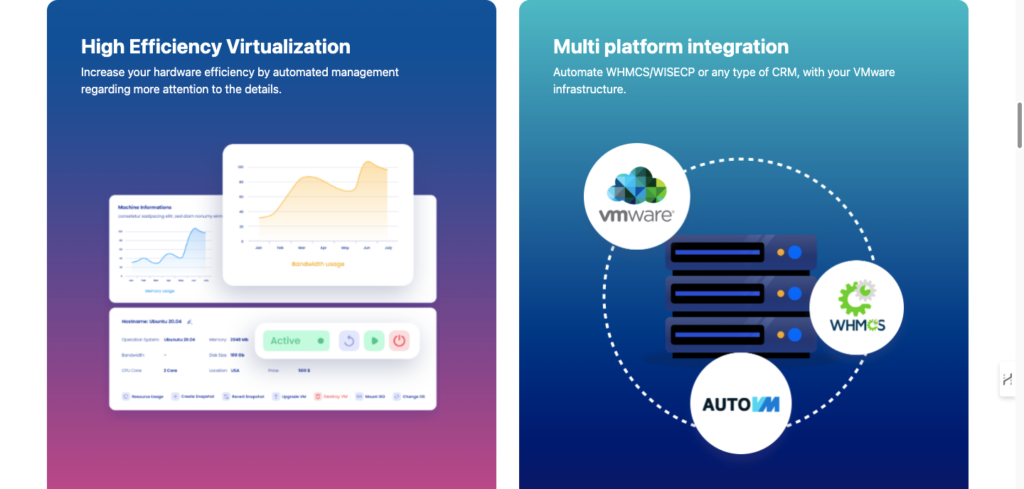Are you tired of the endless hours spent manually provisioning and managing virtual servers? Frustrated by the lack of control your customers have over their VPS resources?
The AutoVM WHMCS Module might just be the game-changer you’ve been waiting for.
Imagine a world where virtual servers deploy themselves in seconds, customers manage their own resources, and your support team can focus on real issues instead of routine tasks.
That’s the power of AutoVM integration with WHMCS – the leading web hosting billing software (WHMCS) that’s consistently ranked among the Top 10 Web Hosting Billing Solutions in 2024.
That’s the power of AutoVM integration with WHMCS.
But what exactly is AutoVM, and how can it transform your hosting business?
Let’s dive into the details of this innovative solution that’s reshaping the landscape of virtual server management for hosting providers worldwide.
TL;DR: The AutoVM WHMCS Module automates virtual server provisioning and management, integrating seamlessly with WHMCS. It offers rapid deployment, customer self-service, efficient resource management, and significant operational cost savings for web hosting providers.
What is AutoVM?
AutoVM is an innovative open-source platform designed to streamline the management of virtual machines (VMs) on VMware ESXi virtualization environments.
As a powerful management layer, AutoVM bridges the gap between customers and hypervisors, revolutionizing how web hosting providers deploy and manage virtual servers.

This cutting-edge solution seamlessly integrates with WHMCS (Web Host Manager Complete Solution), offering a comprehensive automation package that transforms the landscape of web hosting services.
By leveraging AutoVM, providers can dramatically enhance their operational efficiency, reduce costs, and deliver an unparalleled user experience to their clients.
Key Features of AutoVM
AutoVM comes with a range of powerful features designed to streamline VM management. Here are some of the key features:
- Automated Provisioning: Quickly deploy virtual servers using predefined templates.
- Resource Management: Manage virtual networks, storage, and firewalls with ease.
- Monitoring Tools: Monitor server performance and resource usage in real-time.
- Backup Automation: AutoVM handles automated backups and restores to ensure data integrity.
- Multi-Virtualization Support: It supports KVM, OpenVZ, and VMware for flexible VM management.
Why Integrate AutoVM with WHMCS?
The integration of AutoVM with WHMCS creates a powerhouse of automation and efficiency.
This synergy allows hosting providers to offer a feature-rich self-service portal where customers can effortlessly manage their virtual servers and billing through a unified interface.
Key benefits of this integration include:
- Streamlined operations
- Enhanced customer experience
- Improved efficiency
- Reduced manual labor
- Significant cost savings
For more insights on optimizing your hosting business, check out our guide on starting a web hosting company.
How AutoVM Enhances Customer Experience
With AutoVM, customers can create, modify, and delete virtual servers effortlessly. This integration provides them with a self-service portal, allowing them to manage their billing and monitor resource usage from a single dashboard.
Installing AutoVM WHMCS Module
To integrate AutoVM with WHMCS, follow the steps below:
Step 1: Download the Module
- Obtain the AutoVM WHMCS module from the official repository.
Step 2: Upload Files
- Extract the files into the WHMCS root directory.
- Copy
config.php.exampletoconfig.phpand configure it with your domain and API token.
Step 3: Configure the Settings
- Open
config.phpand adjust the settings, ensuring that the correct domain and API credentials are used.
Step 4: Activate the Module
- Go to WHMCS Admin Area > System Settings > Addon Modules and enable the AutoVM module.
Automating VM Provisioning with AutoVM
AutoVM reduces the manual workload by automating virtual server provisioning. Once a customer places an order, the virtual server can be automatically deployed using predefined templates, reducing setup time to as little as 60 seconds.
This automation is a game-changer in the hosting industry, offering numerous advantages:
- Speed: Virtual servers can be deployed in as little as 60 seconds after an order is placed.
- Consistency: Predefined templates ensure uniformity across deployments.
- Reduced Errors: Minimizes human error in the setup process.
- Scalability: Easily handle increased demand without proportional increase in manpower.

This level of automation not only enhances operational efficiency but also significantly improves the customer experience by providing near-instant access to their ordered services.
Managing Virtual Resources Efficiently
AutoVM excels in simplifying the complex task of resource management. Its intuitive interface allows for effortless management of:
- Virtual networks
- Storage allocation
- Firewall configurations
By centralizing these controls, AutoVM ensures that resources are utilized efficiently, leading to optimized performance and cost savings for hosting providers.
Learn more about efficient resource allocation in our article on WHMCS performance optimization.
Monitoring and Reporting Tools
In the fast-paced world of web hosting, staying ahead means having real-time insights into server performance. AutoVM delivers on this front with its robust suite of monitoring tools:
- Resource Usage Tracking: Monitor CPU, RAM, and storage utilization.
- Performance Metrics: Track server response times and network throughput.
- Alert Systems: Set up custom alerts for potential issues.
These tools empower hosting providers to proactively manage their infrastructure, ensuring high availability and performance for their customers.
Backup Automation with AutoVM
Data protection is paramount in the hosting industry. AutoVM takes this responsibility seriously by automating critical data management tasks:
- Regular backups
- System snapshots
- Easy restore processes
This automation not only ensures data integrity but also provides peace of mind for both hosting providers and their clients. In the event of any issues, restoring services to a previous state becomes a breeze.

Multi-Virtualization Support: Flexibility at its Core
AutoVM’s versatility shines through its support for multiple virtualization technologies:
- KVM (Kernel-based Virtual Machine)
- OpenVZ
- VMware
This flexibility allows hosting providers to choose the virtualization platform that best suits their needs or even offer multiple options to their customers, catering to a wider range of preferences and requirements.
Explore more about virtualization options in our guide to managed dedicated servers.
Improving Scalability with AutoVM
AutoVM’s automation capabilities make scaling virtual server infrastructure a breeze:
- Rapidly deploy new VMs to meet increased demand
- Dynamically allocate resources based on real-time needs
- Easily manage larger numbers of VMs without proportional increase in management overhead
This scalability ensures that hosting providers can grow their business confidently, knowing that their infrastructure can keep pace with demand.
For more on scalable hosting solutions, check out our article on best cloud hosting providers.
FAQs About AutoVM and WHMCS Integration
Q1: How long does it take to set up a virtual server with AutoVM?
A: AutoVM can provision a virtual server within 60 seconds after the customer places an order.
Q2: Can AutoVM handle backups automatically?
A: Yes, AutoVM includes automated backup features that help safeguard data.
Q3: What virtualization platforms does AutoVM support?
A: AutoVM supports VMware, KVM, and OpenVZ virtualization platforms.





